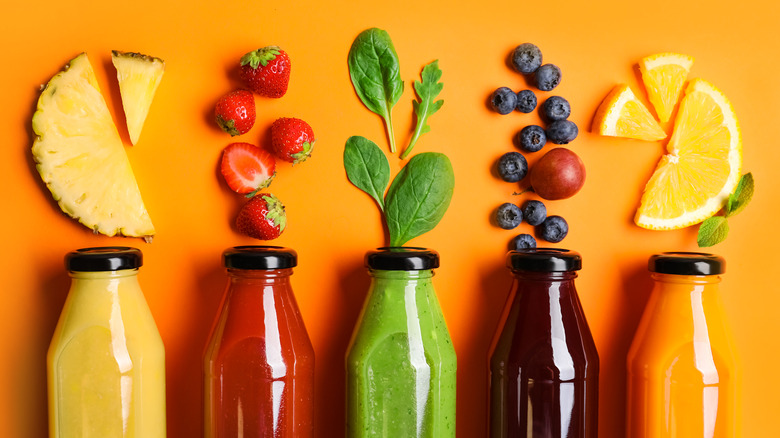Is Cold-Pressed Juice Actually Good For You?
Fresh, cold-pressed juices are among the biggest health trends today and you may be wondering what all the hype is for. First, it helps to know how they're different from other types of juice. Dr. Jennifer Haythe, assistant professor of medicine at Columbia University Medical Center tells Shape, "Cold-pressed juice refers to juice made using a hydraulic press to extract the juice from fruits and vegetables, which is different from the pasteurization process, which involves high heat." And it's the heat factor that has some health experts skeptical over traditional juicers, in which the heat of the fast-spinning blade is thought to damage vital nutrients (via The Daily Meal).
But regardless of how your juice is produced, it's important to note its limitations. For instance, juices don't have all the health benefits, namely the fiber content, that whole fruits and vegetables offer. According to a 2013 study in the European Journal of Nutrition, researchers found juice to be a subpar substitute for participants as it lacked the fiber, pectin, and other healthful cell wall components of the apple in its whole foods form.
Another important consideration is the sugar content. Harvard Health Publishing says fruit juices tend to have a higher glycemic index which can raise blood sugar levels and aren't nearly as satiating as eating the fiber-boosting food itself. But don't count out juice entirely.
The pros of drinking cold pressed juices
If you're not getting enough fruits and vegetables into your diet, drinking cold-pressed juices may help act as a supplement. A 2004 study published in the Journal of the American College of Nutrition showed that fruit and vegetable juice concentrates helped improve folate levels in healthy adults.
Additionally, a 2021 study published in Nutrition and Metabolic Insights found that carrot juice particularly reduced adiposity and reversed metabolic disfunction in rat populations. And a 2017 study published by Scientific Reports claimed, "The consumption of vegetable/fruit juice during the abstinence from food provides essential nutrients and improves compliance." By affecting the microbiome, the study showed juicing changes the bacteria found in the digestive system.
In addition to these studies, a plethora of anecdotal evidence suggests users of juice cleanses have experienced weight loss, improved digestion, and detoxification via Medical News Today. However, while juice can help bolster nutrient intake for a diet already rich in whole foods, experts warn it's not to be used to reverse poor eating habits and much more research is warranted on the total health effects. While there are benefits to consuming juices, make sure to stay hydrated and maintain a healthy diet that supports your lifestyle.


